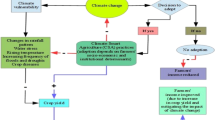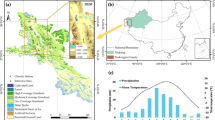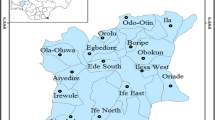Abstract
Climate variability negatively affected Sub-Saharan Africa’s agricultural production. Due to drastic change in climate conditions and its adverse impacts on crop production, climate-smart agriculture (CSA) is considered as a technological and policy solution to mitigate the impact of climate variability on crop production. Climate-smart agriculture (CSA) is the sustainable form of agriculture that aims to increase productivity, improve adaptation, and reduce greenhouse gas emissions into the atmosphere. This study assesses the impacts of climate variability and CSA practices on crop production in Konso cultural landscapes, Ethiopia. The study employed multiple linear regression models to examine the effects of climate variability on crop production and an endogenous switching regression model to assess the impact of CSA practices on crop production. The findings show that climate variability explains 37.4–47.5% of the annual variation in crop production. During the study period (1983–2016), the seasonal production variability range was much wider (10–67%) for three crops: sorghum, maize, and teff (Eragrostis tef). The results also reveal that application of CSA practices such as crop diversification, terracing, manure, irrigation, and rainwater harvesting have positive impacts on crop production. Households that use CSA practices show a significant (p < 0.01) increase in crop production compared to non-users. The high variability in rainfall and warming temperatures results in a decreasing trend in crop yield. On the other hand, the application of CSA practices results in a significant increase in crop productivity in the face of climate variability. In terms of broader policy implications, the culturally intertwined CSA practices in Konso could be used as a learning platform to plan and scale out by integrating them with innovative conservation technologies to achieve widespread adoption in other parts of Ethiopia and elsewhere.




Similar content being viewed by others
Data availability
With the permission of the Ethiopian Meteorological Services and Central Statistical Agencies, data used for this study can be obtained from the corresponding author upon reasonable request.
References
Adego T, Simane B, Woldie GA (2019) The impact of adaptation practices on crop productivity in northwest Ethiopia: an endogenous switching estimation. Dev Stud Res 6(1):129–141. https://doi.org/10.1080/21665095.2019.1678186
Alemayehu A, Bewket W (2016) Local climate variability and crop production in the central highlands of Ethiopia. Environ Dev 19:36–48. https://doi.org/10.1016/j.envdev.2016.06.002
Ali S, Ying L, Nazir A et al (2021) Rural farmers’ perception and coping strategies toward climate change and their determinants: evidence from Khyber Pakhtunkhwa province, Pakistan. J Clean Prod 291:125–150. https://doi.org/10.1016/j.jclepro.2020.125250
Altieri MA, Koohafkan P (2008) Enduring farms: climate change, smallholders and traditional farming communities. Third World Network, Penang
Araro K, Legesse SA, Meshesha DT (2019) Climate change and variability impacts on rural livelihoods and adaptation strategies in southern Ethiopia. Earth Syst Environ 4(1):15–26. https://doi.org/10.1007/s41748-019-00134-9
Asfaw S, Di Battista F, Lipper L (2016) Agricultural technology adoption under climate change in the Sahel: micro-evidence from Niger. J Afr Econ 25(5):637–69. https://ideas.repec.org/a/oup/jafrec/v25y2016i5p637-669.html. Accessed 20 Jun 2020
Amare A, Simane B (2018) Does adaptation to climate change and variability provide household food security? Evidence from Muger sub-basin of the upper Blue Nile, Ethiopia. Ecol Process 7(1):1–12. https://doi.org/10.1186/s13717-018-0124-x
Asrat P, Simane B (2017) Household- and plot-level impacts of sustainable land management practices in the face of climate variability and change: empirical evidence from Dabus Subbasin, Blue Nile River, Ethiopia. Agric Food Secur 6(1):1–12. https://doi.org/10.1186/s40066-017-0148-y
Asrat P, Simane B (2018) Farmers’ perception of climate change and adaptation strategies in the Dabus watershed, North-West Ethiopia. Ecol Process 7(1):1–13. https://doi.org/10.1186/s13717-018-0118-8
Authority for Research and Conservation of Cultural Heritages (ARCCH) (2009) The Konso cultural landscape: World Heritage Nomination Dossier, Addis Ababa
Bedeke S, Vanhove W, Gezahegn M, Natarajan K, Damme P (2018) Adoption of climate change adaptation strategies by maize-dependent smallholders in Ethiopia. NJAS - Wageningen J Life Sci 88:96–104. https://doi.org/10.1016/j.njas.2018.09.001
Belay A, Recha JW, Woldeamanuel T, Morton JF (2017) Smallholder farmers’ adaptation to climate change and determinants of their adaptation decisions in the Central Rift Valley of Ethiopia. Agric Food Secur 6(1):1–13. https://doi.org/10.1186/s40066-017-0100-1
Central Statistical Agency (CSA) (2007) Population and housing census of Ethiopia, Addis Ababa
Davenport F, Funk C, Galu G (2018) How will East African maize yields respond to climate change, and an agricultural development mitigate this response? Clim Change 147:491–506. https://doi.org/10.1007/s10584-018-2149-7
Di Falco S, Kohlin G, Yesuf M (2012) Strategies to adapt to climate change and farm productivity in the Nile Basin of Ethiopia. Clim Chang Econ 3(2):1–18. https://doi.org/10.1142/S2010007812500091
FAO (2010) Climate-smart agriculture policies, practices and financing for food security, adaptation and mitigation. Electronic Publishing Policy and Support Branch Communication Division (Vol. 46), Rome
FAO (2013) Climate-smart agriculture sourcebook. ERIS – European Review of International Studies (Vol. 3), Rome
FAO (2016) Eastern Africa climate-smart agriculture scoping study: Ethiopia, Kenya and Uganda, Addis Ababa
Gashure S, Wana D (2021) Spatiotemporal climate variability and trends in UNESCO designated cultural landscapes of Konso, Ethiopia. Afr Geogr Rev 1–18https://doi.org/10.1080/19376812.2021.1997611
Gashure S, Wana D (2022) Smallholders’ adoption of climate-smart practices in Konso, Ethiopia. Int J Environ Stud 1–12 https://doi.org/10.1080/00207233.2022.2043115
Getachew B (2017) Impacts of climate change on crop yields in south Gondar Zone, Ethiopia. World J Agric Res 5(2):102–110 https://doi.org/10.12691/wjar-5-2-6
Harris T, Consulting TH (2014) Africa agriculture status report 2014: climate change and smallholder agriculture in Sub-Saharan Africa. Alliance for a Green Revolution in Africa (AGRA), Nairobi
Hatfield JL, Boote KJ, Kimball BA, Ziska LH, Izaurralde RC, Ort DR, Thomson AM, Wolfe D (2011) Climate impacts on agriculture: implications for crop production. Agron J 103(2):351–70. https://digitalcommons.unl.edu/usdaarsfacpub/1350. Accessed 20 Jun 2020
Kassaye AY, Shao G, Wang X, Shifaw E, Wu S (2021) Impact of climate change on the staple food crops yield in Ethiopia: implications for food security. Theor Appl Climatol 145:327–343. https://doi.org/10.1007/s00704-021-03635-8
Lobell DB, Field CB (2007) Global-scale climate-crop yield relationships and the impacts of recent warming. Environ Res Lett 2(1):014002. https://doi.org/10.1088/1748-9326/2/1/014002/meta
Marie M, Yirga F, Haile M et al (2020) Farmers’ choices and factors affecting adoption of climate change adaptation strategies: evidence from northwestern Ethiopia. Heliyon 6(4):38–67. https://doi.org/10.1016/j.heliyon.2020.e03867
Müller C, Cramer W, Hare WL, Lotze-Campen H (2011) Climate change risks for African agriculture. Proc Natl Acad Sci 108(11):4313–4315. https://doi.org/10.1073/pnas.1015078108
Muluneh A, Birhanu B, Stroosnijder L, Bewket W, Keesstra S (2015) Impact of predicted changes in rainfall and atmospheric carbon dioxide on maize and wheat yields in the Central Rift Valley of Ethiopia. Reg Environ Change 15(6):1105–1119. https://doi.org/10.1007/s10113-014-0685-x
Omoyo NN, Wakhungu J, Oteng S (2015) Effects of climate variability on maize yield in the arid and semiarid lands of lower eastern Kenya. Agric Food Secur 4(8):1–13. https://doi.org/10.1186/s40066-015-0028-2
Pender J, Gebremedhin B (2006) Land management, crop production, and household income in the highlands of Tigray, Northern Ethiopia: an econometric analysis. Strateg Sustain L Manag 107–139. http://ebrary.ifpri.org/cdm/ref/collection/p15738coll2/id/129592. Accessed 20 Jun 2020
Sani S, Haji J, Goshu D (2017) Climate change adaptation strategies of smallholder farmers: the case of Assosa District, Western Ethiopia. J Environ Earth Sci 6(7):9–15
Schlenker W, Lobell DB (2010) Robust negative impacts of climate change on African agriculture. Environ Res Lett 5:014010
Sertse SF, Khan NA, Shah AA et al (2021) Farm households’ perceptions and adaptation strategies to climate change risks and their determinants: evidence from Raya Azebo district, Ethiopia. Int J Disaster Risk Reduct 60:102255. https://doi.org/10.1016/j.ijdrr.2021.102255
Taylor M (2018) Climate-smart agriculture: what is it good for? J Peasant Stud 45(1):89–107. https://doi.org/10.1080/03066150.2017.1312355
Teklewold H, Mekonnen A, Kohlin G (2019) Climate change adaptation: a study of multiple climate-smart practices in the Nile Basin of Ethiopia. Clim Dev 11(2):1801–1892. https://doi.org/10.1080/17565529.2018.1442801
Tesfaye K, Gbegbelegbe S, Cairns JE et al (2015) Maize systems under climate change in sub-Saharan Africa. Int J Clim Change Strateg Manag 7:247–271. https://doi.org/10.1108/IJCCSM-01-2014-0005
Tesfaye K, Kruseman G, Cairns JE, Zaman-Allah M, Wegary D, Zaidi PH (2018) Potential benefits of drought and heat tolerance for adapting maize to climate change in tropical environments. Clim Risk Manag 19(17):106–119. https://doi.org/10.1016/j.crm.2017.10.001
Vander Wiel K, Bintanja R (2021) Contribution of climatic changes in mean and variability to monthly temperature and precipitation extremes. Commun Earth Environ 2(1):1–11. https://doi.org/10.1038/s43247-020-00077-4
Wahid A, Gelani S, Ashraf M, Foolad MR (2007) Heat tolerance in plants: an overview. Environ Exp Bot 61(3):199–223. https://doi.org/10.1016/j.envexpbot.2007.05.011
Watson E (2009) Living terraces in Ethiopia: Konso landscape, culture, and development. James Currey Hardcover, Cumbria
Yadeta D, Kebede A, Tessema N (2020) Climate change posed agricultural drought and potential of the rainy season for effective agricultural water management, Kesem subbasin, Awash Basin, Ethiopia. Theor Appl Climatol 140(1):653–666. https://doi.org/10.1007/s00704-020-03113-7
Yang M, Wang G, Ahmed KF, Adugna B, Eggen M, Atsbeha E, You L, Koo J, Anagnostou E (2020) The role of climate in the trend and variability of Ethiopia’s cereal crop yields. Sci Total Environ 723:137893. https://doi.org/10.1016/j.scitotenv.2020.137893
Acknowledgements
We thank the Ethiopian National Meteorological Services Agency and the Central Statistical Agency for supplying us with climate and crop production data, respectively. In addition, we are grateful to the household heads and key informants for providing us with their valuable time.
Funding
Addis Ababa University provided financial support for data collection, and Hawassa University provided a stipend and study leave for the first author.
Author information
Authors and Affiliations
Contributions
Sibilo Gashure conceived the idea, collected and analyzed the data, and led the manuscript writing. Desalegn Wana and Cyrus Samimi contributed to the development of ideas and were involved in manuscript reductions. All authors read and approved the final manuscript.
Corresponding author
Ethics declarations
Ethics approval
Addis Ababa University provided us with a letter of support for collecting data. We also obtained informed verbal consent from households and key informants before data collection.
Consent for publication
Not applicable.
Conflict of interest
The authors declare no competing interests.
Additional information
Publisher's note
Springer Nature remains neutral with regard to jurisdictional claims in published maps and institutional affiliations.
Supplementary Information
ESM 1
(DOCX 2640 kb)
Rights and permissions
Springer Nature or its licensor (e.g. a society or other partner) holds exclusive rights to this article under a publishing agreement with the author(s) or other rightsholder(s); author self-archiving of the accepted manuscript version of this article is solely governed by the terms of such publishing agreement and applicable law.
About this article
Cite this article
Gashure, S., Wana, D. & Samimi, C. Impacts of climate variability and climate-smart agricultural practices on crop production in UNESCO designated cultural landscapes of Konso, Ethiopia. Theor Appl Climatol 150, 1495–1511 (2022). https://doi.org/10.1007/s00704-022-04244-9
Received:
Accepted:
Published:
Issue Date:
DOI: https://doi.org/10.1007/s00704-022-04244-9




